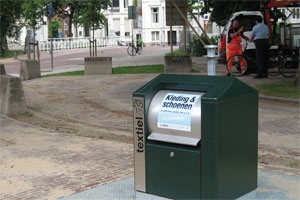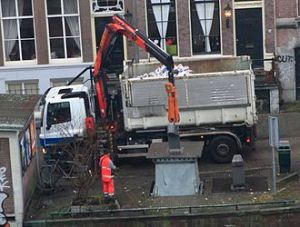Look at this video of a machine in Holland that reads the value of containers and then gives you a credit to use inside the supermarket. They have been in use for at least twenty years.
If you wanted to learn about becoming even more frugal, don’t go past The Netherlands which is very easy to do. It is such a small country. A blink and you have passed it. Mind you, small in size, large elsewhere. I know that fitting twenty people in a VW car involves chucking a sixpence in front of Scottish caber throwers. I believe the same would be achieved in Holland. Perhaps 24 Dutchmen would pile in seeing they are much slimmer.
The frugality has flown into all areas of Dutch life, including the disposal of goods at the end of their used lives.
This from Wikipedia:
Facts and figures[edit]
Landfills are used for less than 10% of all waste. Dutch household waste recycling averages to 60% (2006).[citation needed]
Compost (2003):
The separately gathered organic fraction is 50% of household waste, or 1500 kilotonnes. This is processed to 600 kilotonnes of compost, and the end-product partially exported while over annual national consumption.
Paper (2005):
In the Netherlands itself, the recycled amount in 2005 was up to 2.5 million tonnes, which is 75% of annual consumption. By contrast, in the EU, over 50% of paper is recycled.
The Dutch have a lot of experience in recycling, stimulated by lack of free grounds and significant government funding. This expertise is sensibly exported. A 2006 article reports Dutch involvement in reform of recycling in the UK.[1]
Have a read of this.
http://www.waste-management-world.com/articles/print/volume-11/issue-1/features/dutch-successes.html
Elements of the Netherlands National Waste Policy
The Netherlands’ current waste management policy largely focuses on tackling problems at their onset by preventing the production of waste. When waste production cannot be avoided, waste materials are recycled, and non-recyclable waste is disposed via environmentally acceptable means. The main elements of the policy are:
The Netherlands has the highest percentage of household waste recycling in Europe and the lowest level of land filling.
◦Waste Disposal Hierarchy, (aka Landlink’s Ladder)
◦Waste Treatment Standards
◦National Waste Disposal Planning
◦Producer Responsibility
◦Prevention and Recycling Regulations
Waste Disposal Hierarchy
The main ideas in the Netherlands’ waste policies are represented in a hierarchy model, commonly referred to by the Dutch as Landlink’s Ladder. Named after a member of Dutch parliament who designed it, Landlink’s Ladder applies levels of importance to five core waste management components:
◦Prevention
◦Product Reuse
◦Waste Recovery
◦Incineration
◦Landfill
The model serves as a guide for waste management techniques and places prevention at the top of the hierarchy, as most the desirable means. The idea behind prevention is simple: Avoid waste production as much as possible. The second and third components on the hierarchy are product reuse and recovery. These components include packaging and material reuse and the use of waste as fuel.
Fourth on the hierarchy is incineration. All Dutch waste incineration plants produce energy for electricity generation, heating or industrial steam generation. Last, and most avoided on the hierarchy, is the landfill. Waste in the Netherlands is only sent to the landfill after all other options on Landlink’s Ladder have been exhausted.
Because of prevention-of-waste programs, the volume of waste has been growing more slowly than the Netherlands’ Gross Domestic Product since 1995. The main sources of sustainable energy for domestic consumption – which account for 75% of the total amount – are the co-combustion of biomass in power stations, wind energy and energy from waste incineration plants. The Netherlands’ main sources of sustainable energy for domestic consumption – which account for 75 percent of the total amount – are the co-combustion of biomass in power stations, wind energy and energy from waste incineration plants.
Stringent Waste Treatment Standards
The Netherlands practices stringent standards for waste disposal, and landfills are regulated by checking soil and groundwater for pollution. Incinerators are regulated for air emissions, plant construction and the incineration process itself.
Bans on 35 waste-streams from landfills help keep contamination levels low. Any waste-streams that can be recovered or incinerated, such as household waste, organic waste, plastic waste and demolition waste, are not allowed in landfills.
Certain environmental standards are also set to guarantee quality of secondary raw materials made from waste used for building materials, fuel and fertilizer.
Tags: Amsterdam, Landlink, The Netherlands


October 29, 2014 at 6:09 am |
They’ve got something similar to those machines in some 7-Eleven stores in Australia. But they’re hardly widespread.
I never understand why our governments don’t just follow the countries that are obviously doing the best in whatever area. Let’s copy the Dutch for waste disposal, the Finns for education, for a start.
LikeLike
October 29, 2014 at 6:18 am |
Yes, Master of everything.
That would be the sensible thing. But sense is what is missing. The corporations and Aboot’s love of ‘freedom to defile, spoil and waste’ reigns supreme.
The Dutch right is probably extreme left here.
It is so difficult.
At least at Aldi’s you have to pay if you want a plastic bag.
LikeLiked by 2 people
October 29, 2014 at 6:24 am |
Yes, it’s a refreshing change to go to a supermarket where I don’t have to race the cashier to a “I don’t need a bag” before she puts my small container of yoghurt in an enormous non-biodegradable plastic bag. Or worse – a bottle of milk that has a handle on it.
LikeLike
October 29, 2014 at 7:32 am |
Your post today, is music to my ears. There is a chance, albeit slim, that we may be going to live in Maastricht for 4 months next year. In which case I look forward to seeing all this re-cycling ‘wonderfulness’ in action! 😀
LikeLike
October 29, 2014 at 8:16 am |
You’ll love Maastricht. A very historical city and not far from the Ardennes and so much beauty.
LikeLiked by 1 person
October 29, 2014 at 9:20 am
we have to keep our fingers crossed, it will be very exciting if we manage to pull it off 🙂
LikeLike
October 29, 2014 at 6:32 pm |
Very inspiring to hear about this innovation in waste reduction in the Netherlands. In The Zero Waste Solution, Paul Connett says there is absolutely no reason why all cities can’t reclaim 100% of their waste. The technical know how has existed for decades but powerful interests oppose it.
This is one of the most effective ways to reduce global warming, you create far fewer emissions by reusing stuff, rather than manufacturing it from scratch. You also eliminate the emission of methane – the worst greenhouse gas – from organic waste in landfills.
LikeLiked by 1 person
October 30, 2014 at 12:11 am |
Germany too is great in recycling. It all started in Berlin during the seventies. The bottle return machines are in all supermarkets. The machine gives you a voucher which you can use for shopping or exchange for cash. Many homeless people use this method to get some extra cash. People did not like seeing poor people rummaging in rubbish bins so lately they have put another bin beside the rubbish bin for recycling material. So, it it easier now to retrieve bottles.
LikeLike
October 30, 2014 at 12:39 am |
Of course here the government is ruled by business instead of common sense and what is good for society. The question I seem to forever struggle with, is; did my parents make a bad mistake?
I do know Australia is very large and sunny and people can own their own home, but when I look at the lack of progress and innovation, especially in the area of climate change the cruelty to boat people, I have second thoughts.
On the other hand we did go back for three years and finally could not stand the Dutch way of bureaucracy and ‘order’ either. All those precisely raked gardens, trees all in a neat row. You were not allowed to side-step the footpath, the lack of rusty cars and corrigated iron sheets.
It will always be nagging me.
LikeLiked by 1 person
October 30, 2014 at 1:53 am
Don’t nag yourself any more. You are a better person because you have seen other sides of life. All that is wrong here is so without you being here. You are having an impact via your blog and people who have never been somewhere else can learn from your experience.
This horrible, bleak, soul destroying government we have now will pass and people will see what it really stands for. We are connected to the world and if we continue in Abbott’s way Australia will be punished.
You and I, and many more, know that there are other ways to tackle today’s problems. Australia could be on the forefront of progress but we are not because to many people did not know better when they voted the Liberals in.
LikeLike
October 30, 2014 at 9:27 am
Thanks |Berlioz for your encouraging and very kind words. We went to Sydeny around 1pm and only now got back. An emergency grandchild minding, picking up from school etc.
Yes, it is time again for someone to step up and take over. I can’t see this government lasting. I wish there was someone a bit more oomphy on the horizon. I like Albanese the most, but he seems to have been bypassed.
LikeLiked by 2 people
October 31, 2014 at 9:30 am |
It’s not the width it’s the height of the average dutchman that would challenge the VW test. I am so in favour of the measures to prevent waste in the Netherlands. Local waste management where I live is good, but public information and the will to change are not as good as they might be. Nobody seem to understand that it is now or never.
LikeLike
November 6, 2014 at 3:25 am |
We can all learn a lesson from the frugal Dutch and apparently the Germans too as Berlioz says.
LikeLiked by 2 people
November 7, 2014 at 4:03 am |
Good for The Netherlands. Every country should be following such a wonderful role model. I wish the US would get with a mandated program for every state. I recycle because it is the right thing to do. Few people in my town recycle. It only takes minimal effort and it seems that it is mostly done in the so called affluent parts of town. That is so sad and disgusting that the town council can not pass laws to mandate recycling.
LikeLike